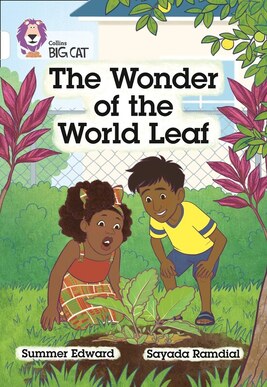|
Interview with author Summer Edward by Lisa Stringfellow KidLit in Color welcomes author Summer Edward to our blog to discuss her picture storybook, The Wonder of the World Leaf, a heartfelt story that also reflects the rich, vibrant culture of the Caribbean. Would you please give our readers a brief summary of your picture storybook? Eight years ago, when I was battling an illness, this young girl appeared in my mind. Her name was Wygenia and she kept hanging around, so I paid attention to her and it turned out that she was sad because someone she loved was ill. I felt that Wygenia needed something in order to help the person she loved, but I didn’t know what. At the time, I took an extended trip back to Trinidad where I grew up, and my mother took me to this wonderful wellness center on the island where I saw a naturopathic doctor and master herbalist. My visits to the wellness center inspired me to start learning more about the island’s medicinal plants, and when I read about the medicinal uses of Wonder of the World leaves, I suddenly knew what Wygenia needed—a leaf. Not a fig leaf of shame, or a four-leaf clover of luck, but a wondrous leaf of possibility. I started to write and as I followed Wygenia through the story, I discovered that she also needed the presence and help of people who cared for her. That’s my long-winded way of telling you how The Wonder of the World Leaf ended up being the story of a young Trinidadian girl who, with the loving support of her community, grows a Wonder of the World plant, and uses the leaves to help her beloved grandmother recover from illness. Is your picture storybook based on any real experiences? My own experiences using traditional healing practices showed me the importance of tending to the human being in the same fashion that a gardener tends to her plants. Any gardener will tell you that there are many variables involved in plant care. Likewise, at the wellness center I visited, they give weight to the idea that the social, cultural, emotional and moral roots of illness must be treated, along with the physical symptoms. It’s the responsibility of the community to address all of these variables so that the sick person can flourish again. I wrote what I learned about, and experienced with, traditional healing practices into The Wonder of the World Leaf, which is on a surface level, a story about plants and gardening. In her determination to help her Grannie, Wygenia turns to the traditional healing practices of Trinidadian people, and she, her friends and family tend to the things that truly matter. In doing so, lots of good things sprout in their collective lives. In the book, Wygenia is part of a vibrant island community. Can you share more about the relationships she has? Wygenia, like many Caribbean children, has a strong bond with her grandparents. One of her grandfathers has recently died at the beginning of the story, and although it’s left unsaid, one can imagine that his death is partly what fuels Wygenia’s resolve to help her grandmother heal. Wygenia’s classmate, Sanjay, who also happens to be her next-door neighbor, and Sanjay’s aja (‘aja’ is a Trinidadian Hindustani word that means ‘grandfather’) are also significant people in Wygenia’s life. They share in Wygenia’s concern for her grandmother and play important roles in the old woman’s convalescence. There are other community members in the story whose succor and goodwill provide a buffer for Wygenia and her family during their time of difficulty. Wygenia’s faith is also a kind of relationship. She’s in a relationship of trust with something bigger than herself. Whatever that ‘something’ is, it keeps her hoping and believing that her grandmother can get better. Your book includes many Trinidadian words and phrases. Talk to us about the importance of language and dialect in your story. Writing in a blend of Trinidadian English and British English is natural for me; I don’t really see it as a choice. I grew up speaking Trinidadian English at home and with my friends, but I was educated largely in British English. I’ve taken ownership of both varieties of English and see them both as equally belonging to me. I still speak both, which is something that’s rooted in the Trinbagonian experience. The language in The Wonder of the World Leaf is a reflection of that, which is what makes the story authentic. There are some things that can’t be sufficiently expressed in British English, and so for the characters in the story, Trinidadian English is the language of emotions, humor, intimacy, national identity, and cultural solidarity. By the way, because I moved to the U.S. as a teen, I also speak American English, so constantly negotiating three languages is my jam. You're also an editor. How has that influenced your work? Editing children’s books and short stories for children is something I’ve been doing since 2011. I currently work as a children’s fiction editor at Heinemann. A literary agent once advised that I should either give up writing or editing because I couldn’t do both simultaneously. I’ve learned to distrust that idea. Before I started editing, I read voraciously but more narrowly. As an editor, one is forced to read very broadly, to engage deeply and seriously with all kinds of stories that lie beyond one’s usual tastes and predilections. Also, when you’re an editor, reading stories is your job; there are no lulls in your reading life; an on-again, off-again relationship with literature isn’t an option. There’s also no respite from the difficult work of wrangling with words, or to be frank, from wrangling with one’s ego. As an editor, one’s ego is constantly being tamped down and held in check by the nature of the job. Also, an editor doesn’t have the writer’s luxury of procrastination and creative resistance. All of this has made me a better writer. The best way to explain it is that working as an editor is like taking a never-ending intensive in writerly discipline. What do you hope readers learn or take away from The Wonder of the World Leaf? The reason I write anything is so that readers feel heard and seen. In the Western world, there’s social stigma derived from both popular and medical views of illness. Illness is something to be feared, something to be dealt with privately and individualistically, something fraught with shame, something that people feel uncomfortable talking about. That’s why in Western societies, so many ill people tell stories of friends and even family abandoning them at precisely the time when they need community the most. I hope that the way Wygenia deals with her grandmother’s illness helps readers realize that there is another, much better way. When it comes to living a healthy life, often the old ways are the best ways. Gathering with friends and family, telling stories, laughing together, sharing a meal, simply listening to another human being, sitting in silence, planting a garden, connecting with nature…all of that simple stuff really works. They’re the remedy for all the loneliness, pain and sadness out there. Simple human interactions, in which you merely give another person the gift of your presence, are what keep people healthy, and what sick people in particular are desperately in need of. A seven-year-old who reads the book already knows this, but capturing it in a story is my way of making sure they never forget. Is there anything else you would like to add? Sayada Ramdial created the illustrations for The Wonder of the World Leaf and she did a wonderful job. Sayada is a fellow Trinidadian-American, and I think our collaboration has enabled the telling of a truly Trinidadian story that’s also universal, one that I hope readers everywhere enjoy reading. Summer Edward is a Ginkgo Prize longlisted author who writes for all ages. Her children's book debut, The Wonder of the World Leaf, was recently published by HarperCollins UK. She has six more children's books forthcoming, to be published by Heinemann (USA) in summer 2021 and spring 2022. She created Anansesem, an online magazine covering Caribbean literature for young readers, which was published for a decade. When she is not writing, she works as a children's fiction editor at Heinemann and reviews children's and young adult books for The Horn Book Magazine. Born in the Caribbean island of Trinidad, she grew up in Trinidad and Philadelphia, and currently divides her time between the U.S. and Trinidad. Learn more at her website: www.summeredward.com
Kirstie
8/17/2021 03:00:57 pm
Great interview! I look forward to reading this book. Comments are closed.
|
Archives
July 2024
Categories
All
|


 RSS Feed
RSS Feed



